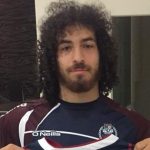
Pro rugby player Devin Ibanez wasn’t expecting global attention when he came out publicly via Instagram. He explains how he’s tackled the media…
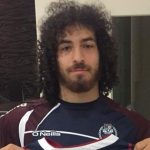
Three weeks ago, rugby player Devin Ibanez posted for the first time to his newly created Instagram account.
The post contained three photos of Devin with his boyfriend, Fergus Wade, and a message of hope for the future – that by living a more authentic life as an out gay man, he would find greater happiness and also have a positive impact on others.
Since then, the Massachusetts-born flanker has been featured across the global LGBT+ media space, seen his story of suffering a life-threatening injury while playing in England shared on Sky Sports, and attracted over 5,000 followers already to his Insta.
Devin, who most recently played with Major League Rugby club New England Free Jacks, is one of just a handful of male rugby players who have played the game professionally to have come out publicly as gay or bi, anywhere in the world.
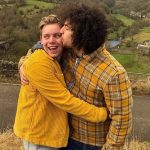
So what’s his experience been like so far, having made such a big personal announcement? What does the nature of his coming out journey tell us about being LGBTQ+ in sport in 2021? And what are his future plans in rugby?
In our latest Q&A article for Sports Media LGBT+, we put all these questions to Devin.
And with January 21 marking Devin and Fergus’s three-year anniversary, there’s no better time to chat to ‘That Gay Rugger’ about his story, particularly how he’s tackled the media…
JH: Hi Devin! Thank you for sharing your story so publicly, and for getting in touch with us – the last few weeks must have felt like a bit of a whirlwind! When you reflect back, what did you anticipate from creating your @thatgayrugger account – and how has the reaction been for you?
DI: It’s been a whirlwind! I truly didn’t anticipate this type of response when I made that post. In years past, when I had planned on coming out publicly during an active MLR season, I was more mentally prepared for a potentially large response. When I made the post on December 29, I felt like I had to do it for my own mental health, as well as Fergus’s.
The reaction has truly blown me away. I hoped that it would be impactful and inspire some others, but I never could have anticipated how far our story has spread. I’ve heard from people from France, Italy, Lebanon, England, Scotland, Tunisia and more. I’ve received overwhelmingly positive feedback about my decision from teammates, family, friends and strangers. I’ve had the chance to connect with people who have had similar experiences in the sport who have told me how much my story has impacted them.
While I would like to say that every single response has been positive, that hasn’t been the case. The negative remarks have been drowned out by the positive, but they are still there nonetheless. The rugby community in particular has been incredibly supportive overall.
The media so far has been quite overwhelming, but in the best way possible. I have been truly humbled by the amount of publications reaching out asking more about my story. I never could have imagined that it would resonate with people from so many different places.
The LGBTQ+ media I have worked with so far have been especially helpful and supportive. They’ve helped me hone my story and given me a platform to spread my message of LGBTQ+ inclusivity and equality in sport.
I know a little about Massachusetts – my fiance and I went there on holiday a few years back. What was it like growing up there – and also, as part of that, growing up gay?
Overall, I enjoyed my time growing up in Brookline, which is a bordering town of Boston, and my family has been based here my whole life. I was a bit of a handful as a child, so I struggled fitting in at school. I just had a tremendous amount of energy and traditional schooling required me to be in one place for hours at a time which was a struggle!
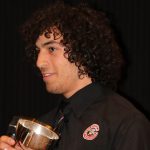
But Brookline is a very accepting place in terms of being welcoming to the LGBTQI+ community. So in that sense, I had it very easy growing up here, and there were several gay students who were out at my high school.
However, I didn’t feel comfortable coming out while I was at Brookline. Although I knew it was an overall accepting place, I was serious about rugby and being immersed in a hypermasculine culture where homophobic terms were quite common, I felt it was better to keep my sexuality to myself. So I can’t imagine how difficult it would be to grow up in places where there are no out gay students or support systems.
Even under what many would consider ideal conditions in my community, I still struggled with coming out immensely. However, I just told myself that my sexuality didn’t matter and that it wasn’t relevant.
Take us back to the beginning of your sports journey. How did you get into rugby, and what were your experiences like in the sport as a teenager?
Getting into rugby was an interesting journey to say the least. My primary sport going into high school was actually ultimate Frisbee and growing up, my favourite sport to follow was baseball. When I first got to high school, I decided to give American football a go. That was a complete disaster. I hated the pads, I was afraid of the contact, and I was called a ‘f****t’ and bullied mercilessly.
Since there was no official ultimate Frisbee team at Brookline, I decided to try my hand at baseball instead. I went into freshman team tryouts with no baseball experience, hoping for the best. That went about as well as you could expect, and I was one of only four players who did not make the team.
Fast forward a year, and I still hadn’t found a sport to play at high school. I had always been a very active kid and loved to compete, even if I wasn’t a particularly talented athlete. I wasn’t very fast, strong, or coordinated – truly a triple threat! One day, I decided to sit down with a school guidance counselor and look through what sports were offered. That’s when I saw rugby. The only thing that I knew about rugby was that my friend played it and that it was a contact sport.
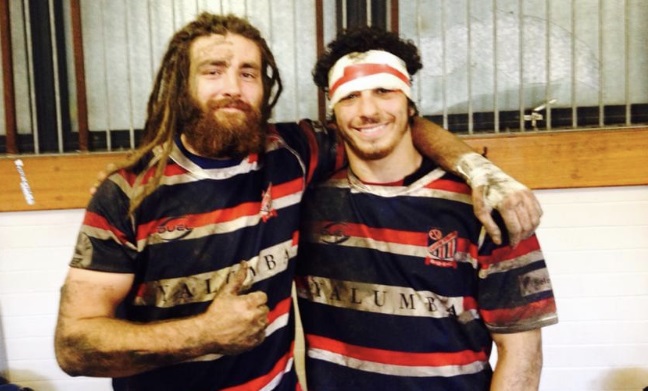
I decided to give it a shot and instantly fell in love. One of the first things I remember about playing rugby was all of the positive reinforcement from my teammates and coaches. In football, it seemed to constantly be about bringing someone down or one-upping each other. Rugby brought me such a sense of community and support. My fear of contact quickly disappeared as I began to get positive feedback from my team.
It quickly became clear that this was a sport I could potentially excel at. I started on our first side for every match, despite it being my first season playing. I decided then that I wanted to pursue the sport full-time. I began training and playing in the fall, spring, and summer to maximise my potential.
While I came into my own as a player, I still found myself hesitant to share about my sexuality. Rugby did not exist in a vacuum free of homophobia. I still found team-mates and sometimes coaches freely using the word ‘gay’ to describe things that were stupid, or using the word to belittle others. I did my best to keep my head down and fit in and improve as a player.
You met Fergus three years ago. What brought you together, and what can you tell us about how you fell in love?

Fergus was in Boston doing research for a Harvard Lab. We met in December 2017, just before he went home to be with his family for the holidays. We met the same way that many couples do, online through a dating app!
We began by talking about my experiences in England [Devin played for Scarborough RUFC in 2017] and instantly hit it off with our similar sense of humour. After talking for a few weeks on and off, I decided to ask him if he wanted to meet up in person. We met and I ended up taking him to my favourite Thai place and we talked for hours.
It felt so natural and I fell for his genuinely kind heart and quick wit. After sharing a lovely meal together, we went back to my apartment and I showed him my rooftop. It was there that we shared our first kiss. We managed to see each other a couple more times before he left to go home for break.
We kept talking every day while he was back home and began making plans to spend more time together when he came back. When he got back to Boston, it felt like we were reuniting after knowing each other for a long time. It felt so easy and we wanted to spend as much time together as possible. After a couple weeks of being inseparable, Fergus asked me if I wanted to make it an official relationship. I was over the moon and said yes without a second thought. We began to see each other almost every day and were essentially living together. We would take trips away on the weekends when I didn’t have rugby matches and spent as much time together as possible.
It all happened very quickly, but suddenly we were essential parts of each other’s lives. The time began to fly by and Fergus’s year in Boston came to an end. We were devastated, but we figured a long-distance relationship probably was not realistic. Our final night together was a mess of sobbing, emotions, and dread for what was next. As the days and weeks following his return to England went by, the idea of leaving our love in the past felt wrong. We were still talking every day and both clearly still wanted to be with each other. We decided to hell with practicality, we were going to do everything in our power to make this work. We now have our three-year anniversary on January 21.
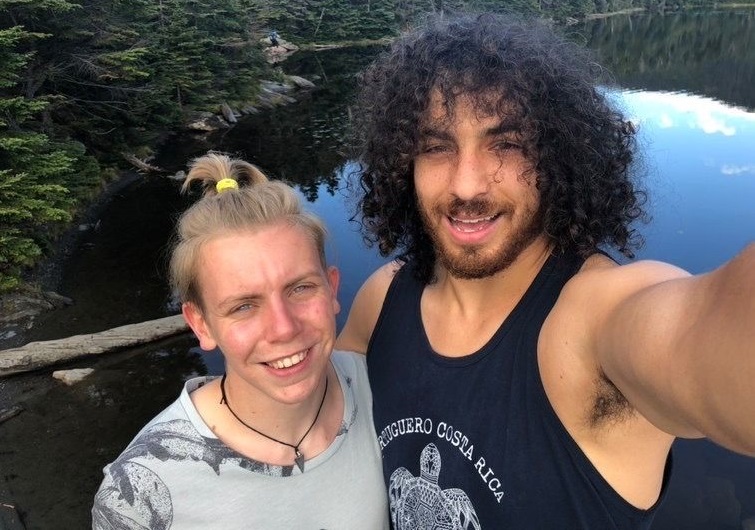
What would you say to another athlete who’s seen your Insta account and all the media coverage and is contemplating possibly doing something similar?
The best advice I can give is to take your time and wait until you’re ready. Everyone moves at their own pace and there’s no right or wrong time to come out, it’s entirely dependent on you and your own experiences. Take the time to build up a strong support system and prepare yourself for the potential media attention. Reach out to organisations that help athletes prepare to come out publicly, such as Sports Media LGBT+.
While I’m happy that I decided to come out publicly that day, I was not fully mentally prepared for the attention it was going to bring. Having a support system in place and a plan for how to navigate the media will go a long way and make the process much more manageable.
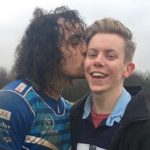
I hope that more athletes will come out so that over time, it will be less necessary to be prepared for that level of attention. But also know that you will be met with overwhelming positivity and love from around the world for sharing your story. That you may impact people in ways that you didn’t think you could just from pursuing a sport that you love. Being able to potentially impact people in that way is so special and I’m truly humbled and touched by those who reached out to me with their support.
How can our industry can make the coming out experience less intimidating for male athletes like yourself, particularly in team sports?
I’m not sure that the media can do anything to make the process easier. The fact remains that until more male athletes feel comfortable coming forward in this way, there will always be a disproportionate amount of media attention on them.
I’m truly grateful that the media has covered my story in the way that it has and allowed me to reach so many people. But I can also understand why the idea of dealing with that level of media attention would be daunting to so many people.
Were there any other athletes who inspired you? We help to share stories in order to empower others in our LGBT+ in sports community to be authentic too, whether they are publicly out or not.
I’ve always found Gareth Thomas to be a huge inspiration. His struggles and the way he was embraced by his former teammates at the highest level of the sport really resonated with me.
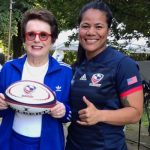
But someone closer to home who really inspired me to continue on my journey was Rugby United New York coach Tiffany Fa’ae’e. When she became the first female professional coach in Major League Rugby, she received such an amazing response. Any negative comments were completely drowned out by a wave of positivity and the young people she inspired.
I saw how much her visibility and representation mattered and it gave me a glimpse into the potential positive impact I could have. Her story inspired me to push harder and do everything in my power to follow through on my goal of becoming an out gay professional player.
One of the biggest stories in sport recently has been the Justin Thomas homophobic language incident on the PGA Tour. What are your thoughts on that, and the effect of hearing words like ‘f****t’ uttered so casually by guys like him in sports?
I was extremely disappointed, but not at all surprised by the incident. As someone who has been among male athletes in a competitive setting, it’s very clear that homophobic language is still a prevalent part of sports culture. I think that there’s a perception among male athletes that using homophobic language is the same as any other swear or bad word. In the sense that it’s just a word that you can throw out there when you’re frustrated that doesn’t have any reverberating effects.
This is something I think is important to express to participants in sport who do not identify as LGBTQ+. As someone who was a closeted athlete for most of his life in sport, language matters. I was often looking for ways to identify who would support me if I were to come out publicly without explicitly sharing my sexuality with them. The language that my teammates used was one of the easiest things that I was able to monitor and identify.
When you hear people freely use homophobic language or use it as a way to belittle others, it will resonate with you. It will contribute to an ever-growing seed of doubt that your teammates may not accept you or have your back. I think it’s important to try and convey the harm that these words can have, regardless of context. The fact that your words could be contributing to someone feeling unsafe or unsure of their place in the sport is one that should make all athletes think twice.
What are your ambitions now, in rugby and in life more generally? Any other closing thoughts?
Rugby-wise, my goal is to continue playing at the highest level possible for as long as I can, whether that means signing with Major League Rugby again, or finding a team closer to Fergus in the UK. Another personal goal is to become the first out gay captain of Team USA for the 2022 World Maccabiah Games in Israel. That would be a tremendous honour and an accomplishment I would take immense pride in.
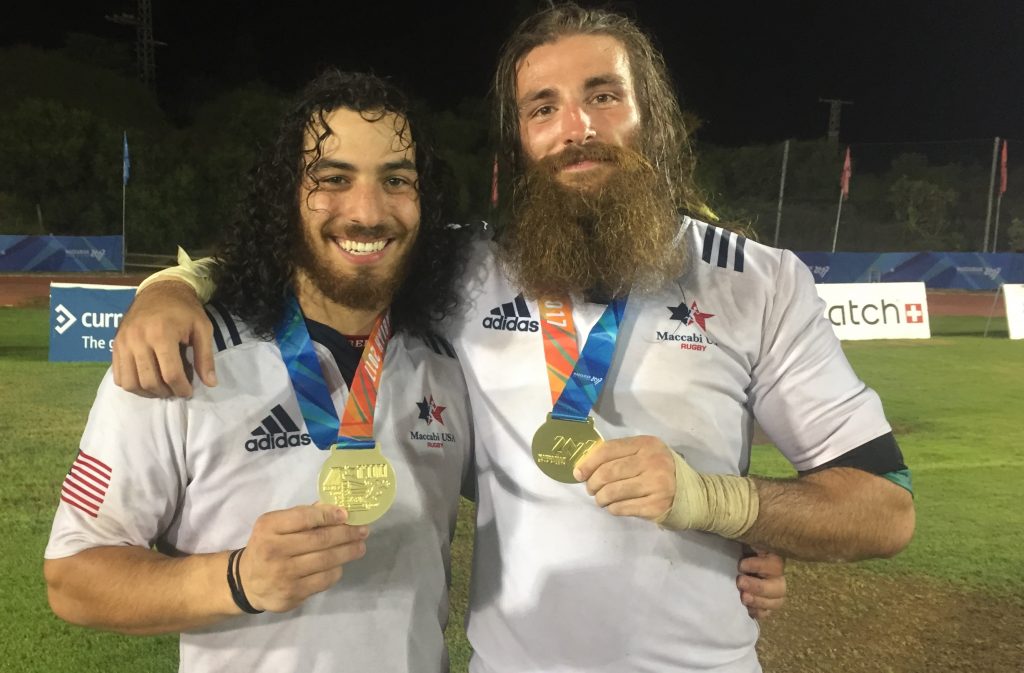
Beyond playing, I also hope to pursue coaching across the globe and being an advocate for LGBTQI+ inclusivity in sport. My goal is to reach as many people as possible who may be impacted by my story and try to inspire them to be themselves openly without fear of backlash. I want to travel the world and be as visible as possible in hopes that this process will be much easier and less daunting for the next out gay athlete to come forward in rugby.
Thank you to Devin – follow him on Instagram at @thatgayrugger.
Sports Media LGBT+ is a network, advocacy, and consultancy group that is helping to build a community of LGBT+ people and allies in sport. Learn more about us and see our calendar of forthcoming events here.
Like Devin’s, your story could help to inspire other people – you don’t have to be famous to make an impact, and there are huge gains to be made both personally and more widely in sport. Start a conversation with us, in confidence, and we’ll give you the best advice on navigating this part of your journey. Email jon@sportsmedialgbt.com or send a message anonymously on our Curious Cat.
Further reading…
Athletics Pride Network’s Gareth Burrell shares his coming out story
Jak Ball: Coming out lifted a mental weight off my shoulders